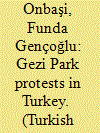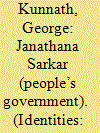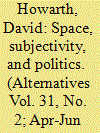|
|
|
Sort Order |
|
|
|
Items / Page
|
|
|
|
|
|
|
| Srl | Item |
| 1 |
ID:
167417


|
|
|
|
|
| Summary/Abstract |
This article analyses climate change activism through the framework of agonism. It discusses dominant political theories of climate change and then contrasts those with agonism. Next, it proceeds to analyse the logic of resistance in climate change activism, focusing on the 2017 People’s Climate March (PCM17) to understand how it articulated both its conceptions of the political and of climate change. This article argues that, in articulating its logic of resistance, the PCM17 served to depoliticise climate change by embracing a consensus-based conception of the political and a singular conception of climate change. The PCM17’s claim of resistance therefore constrained dissent and was ultimately counterproductive to a vibrant politics of climate change. Rather than understanding climate change as singular, I argue that reconsidering climate change as multiple – that is, as an unstable, contested representation of multiple political ecologies – provides the political space necessary to accommodate dissent in debate about climate change without abdicating the responsibility to acknowledge its existence as a political problem. An agonistic framework of climate change politics severs the tie between the political and consensus, allowing a radical democratic politics of climate change to adopt a robust logic of resistance in climate change activism.
|
|
|
|
|
|
|
|
|
|
|
|
|
|
|
|
| 2 |
ID:
145632


|
|
|
|
|
| Summary/Abstract |
This study aims at a critical analysis of the Gezi Park protests of 2013. Without denying the importance of understanding their ‘before and after,’ it tries to understand what happened ‘during’ the Gezi protests. It argues that the practice of Gezi can be understood via the theory of radical democracy, whose core concepts and premises are particularly appropriate for making sense of what happened during Gezi protests. Drawing on those concepts this study argues that (i) Gezi was a manifestation of the ‘undecidability and contingency of political identities’; (ii) a highly suitable atmosphere developed during the protests for the emergence of a ‘(counter) hegemonic relationship’ in the radical democratic sense of the term; (iii) Kemalism unsuccessfully attempted to act as ‘the nodal point’ to fix the free floating of ideological elements; (iv) ultimately, no particularity managed to take over the representation of ‘the chain of equivalence’ established among the elements excluded from the current neoliberal-conservative hegemony.
|
|
|
|
|
|
|
|
|
|
|
|
|
|
|
|
| 3 |
ID:
184067


|
|
|
|
|
| Summary/Abstract |
This article focuses on the agency of the poor in the context of rebel governance in rural India. During its five-decade-long armed agrarian struggle, the Maoist movement has established in several villages an alternative structure of governance called Janathana Sarkar (people’s government) with Adivasis and Dalits as the primary agents of social transformation. Drawing on the author’s long-term ethnographic fieldwork in the Maoist guerrilla zones, this article explores the insurgent consciousness of Dalits and Adivasis by engaging with two interrelated questions. First, how does Janathana Sarkar function as a platform for radical democracy by the marginalised? Second, is violence inherent in the emergence and manifestation of this agency? These questions, although primarily focused on the agency of Dalits and Adivasis in Janathana Sarkar, have a wider relevance to the study of transformative politics of the poor and radical democracy, which have received inadequate attention in the scholarship on rebel governance.
|
|
|
|
|
|
|
|
|
|
|
|
|
|
|
|
| 4 |
ID:
106646


|
|
|
|
|
| Publication |
2011.
|
| Summary/Abstract |
In this article we contrast the theoretical tradition of radical democracy developed by Chantal Mouffe with an alternative tradition of radical democracy rooted in the practices of subaltern social movements. While the former is wedded to the context and aspirations of Western modernity, the latter consists of place-based forms of 'colonial difference' within the Third and Fourth Worlds that are subalternised by the (aggressively globalising) modern tradition of democracy. Working within a 'modernity/coloniality' framework, we contrast these traditions of radical democracy along three main axes: 1) the logic of articulation among diverse struggles and movements; 2) the orientation towards, and aspirations with respect to, the state; and 3) the relation to the global scale and vision of the 'pluriverse'.
|
|
|
|
|
|
|
|
|
|
|
|
|
|
|
|
| 5 |
ID:
071962


|
|
|
|
|
| Publication |
2006.
|
| Summary/Abstract |
This article questions the more exaggerated claims of a free-standing "spatial heuristic" in explaining, justifying, and criticizing social practices, not least because the category of space remains undertheorized and conceptually indeterminate. Building upon the work of Jacques Derrida, Michel Foucault, Martin Heidegger, Ernesto Laclau, and others, the article clarifies the category of space, showing precisely how and why it is important for understanding politics, subjectivity, and ethics. It calls for the envisaging of "spaces of heterogeneity" that are compatible with radical democratic demands for equality and a "politics of becoming," and that can form the basis of a poststructuralist conception of cosmopolitanism.
|
|
|
|
|
|
|
|
|
|
|
|
|
|
|
|
| 6 |
ID:
184066


|
|
|
|
|
| Summary/Abstract |
This article discusses radical democratic citizenship in the context of the ‘Rojava Revolution’, an ongoing society-building effort that emerged in majority Kurdish regions in the context of the Syrian war. It describes aspects of the political vision of Abdullah Öcalan, as interpreted and applied by activists involved in the democratic self-governance system in Rojava (northern Syria), since 2012. Drawing on ethnographic fieldwork in the region, the article focuses on the ways in which activists frame their revolution and notions of radical democratic citizenship as consciousness-raising efforts against the state system. Centering the role of educational institutions, it argues that theoretical discussions within the Kurdish freedom movement seek to emancipate political action from state-centric ways of articulating political will, justice demands, and wider geopolitical interests. Lastly, it encourages studying radical democracy efforts by taking seriously the political vocabularies, everyday practices, and long-term perspectives advanced in collective self-organisation from below.
|
|
|
|
|
|
|
|
|
|
|
|
|
|
|
|
| 7 |
ID:
101761


|
|
|
|
|
| Publication |
2010.
|
| Summary/Abstract |
The 1994 Zapatista rebellion in Chiapas, Mexico, illustrates "glocal" resistance to the neoliberal world order. While rooted in indigenous communities, the rebellion is best understood not in terms of essentialist identities but rather as an ongoing process of creating new social practices in resistance to domination. The sustainability of the movement depends not on the overthrow of the state, but on the effort to continually transform society. Four important contributions emerge from the experiences of the autonomous communities and municipalities in Zapatista-influenced territory: (1) The reframing of the concept of power. (2) The construction of new social subjectivities. (3) A redefinition of the concept of autonomy. (4) Radical democracy.
|
|
|
|
|
|
|
|
|
|
|
|
|
|
|
|
|
|
|
|
|